|
De Nederlandse schrijfster Renate Dorrestein werd geboren in Amsterdam op 25 januari 1954. Zie ook alle tags voor Renate Dorrestein op dit blog.
Uit: Reddende engel
““Pal boven me hing een roofvogel te loeren op een prooi. Kale bomen, halfbezwijkend onder trossen maretak, strekten hun takken uit naar de vale hemel. Kraaien pikten met felle bewegingen in een omgeploegde akker. Je had hier vreemde grondsoorten, löss en mergel. En grottenstelsels waarin je voor altijd kon verdwalen, met als enig gezelschap de vleermuizen die er kwamen overwinteren. Eerder op de dag was ik langs gammele schuurtjes van geteerd hout gereden, met naast een ervan een pony die suïcidaal uit zijn ogen keek. En overal kruisbeelden en kapelletjes, opgetuigd met plastic bloemen die door de jaren heen hun kleur hadden verloren.
Midden op de vijfsprong op de heuvel stond ook zo’n kruis. Op zoek naar houvast liep ik er over de onverharde weg naartoe. Het was niet groot, het reikte maar net tot mijn middel. Ik moest me bukken om de inscriptie te kunnen lezen: ‘Red ons, Heer.’
Schielijk draaide ik me weer om. Ik had nu ergens in een dorpscafé achter een biertje kunnen zitten, gebrouwen met water uit eigen bron en hop en gerst van eigen land. Als ik maar beter had opgelet.
Als ik de tekenen niet veel te lang in de wind had geslagen, was ik hier zelfs nooit beland.
Maar geluk maakt je lui en zelfgenoegzaam.
Veel mensen schijnen het te betreuren dat je geluk niet kunt hamsteren, zoals bijen met hun honing doen, zodat je je opgeslagen voorraad kunt aanspreken als de nood aan de man komt. Die mensen realiseren zich niet dat het oprakelen van oud geluk juist een afschuwelijke bezigheid is.
Ik ging weer in mijn auto zitten en tuurde onthand door de voorruit. Verder van huis dan hier in Zuid-Limburg had ik niet kunnen komen zonder de grens over te rollen. Kilometers maken. Afstand creëren.
Moest ik rustig afwachten totdat er iemand langsreed die me zou kunnen vertellen dat er een paar kilometer verderop al een benzinepomp was, als je de weg tenminste wist? Zo ver kon ik nu ook weer niet van de bewoonde wereld vandaan zijn. Vanmiddag was ik door het ene dorp na het andere gereden, zonder dat een verblijf in een ervan me aantrekkelijk had geleken.”
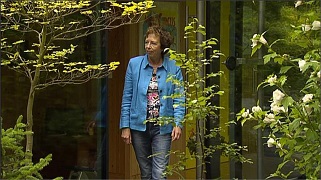
Renate Dorrestein (Amsterdam, 25 januari 1954)
De Nederlandse schrijfster Lisa Weeda werd geboren in Dordrecht op 25 januari 1989. Zie ook alle tags voor Lisa Weeda op dit blog.
Uit: Rijskracht
“Mijn handen trillen om de plastic hengsels van mijn ALDI-tas. Ik schud ze los, recht mijn rug tegen de leuning van de bank. In mijn laatste schone T-shirt zit ik tegenover twee meisjes met doorschijnende blouses. Net werd een man met een ronde bril omgeroepen. De zaal gonst.
‘Heb je zo’n zenuwen jongen?’
Ik ken Annie net een half uur. Ik weet dat ze vierenzestig is, minstens negentig kilo weegt en inmiddels ook dat ze niet begrijpt hoe het opladen van een OV-chipkaart werkt, dat haar man gepensioneerd bouwvakker is en ze al weken naar deze dag uitkijkt.
‘Een beetje,’ mompel ik.
‘Wat ga jij bakken?’ Annie beweegt haar hand naar mijn meegebrachte spullen.
‘Een tarte tatin,’ zeg ik. ‘Met peren.’
Ik schuif de tas een stuk van haar weg en probeer daarbij geheimzinnig maar dwingend naar haar te lachen; optiefen, oude graftak. Annie gaat een stuk van me af zitten. Ik voel het bankje trillen wanneer ze haar billen opzij schuift. Het hout schokt, ik bibber als een kind op een duikplank. Een kort moment kijkt ze naar mijn vale shirt, mijn afgetrapte Nikes.
‘Je ziet er niet uit als iemand die bakt.’
Ik kijk terug. Haar borsten hangen minstens vijftien centimeter lager dan de borsten onder de blouses van de meisjes tegenover ons.
‘Ik doe het voor mijn moeder.’
Als mijn naam wordt omgeroepen sta ik op en klop Annie onhandig op haar schouder. De huid onder haar shirt trilt een beetje na wanneer ik mijn hand weghaal. Daarna loop ik richting de brede schuifdeuren.”
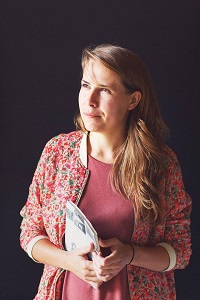
Lisa Weeda (Dordrecht, 25 januari 1989)
De Israëlische schrijver David Grossman werd geboren op 25 januari 1954 in Jeruzalem. Zie ook alle tags voor David Grossman op dit blog.
Uit: Komt een paard de kroeg binnen (Vertaald door Ruben Verhasselt)
“Goedenavond, goedenavond, goe-den-avond Caesareaaaaaa!’
Het podium is nog leeg. De schreeuw weergalmt achter de coulissen. De mensen in de zaal vallen langzamerhand stil en glimlachen verwachtingsvol. Een broodmagere, kleine, gebrilde man vliegt door een zijdeur het podium op, alsof hij erop wordt gesmeten of getrapt.
Hij maakt struikelend nog een paar passen, valt bijna, vangt zijn val op met twee handen op de houten vloer. En dan steekt hij abrupt zijn achterste omhoog. Hier en daar wordt in de zaal gelachen en geklapt. Er komen nog steeds luidruchtig kletsende mensen binnen.
‘Dames en heren,’ roept iemand die van achter een controlepaneel met samengeperste lippen de belichting verzorgt, ‘geef hem een applaus, hier is Dovele G.’ De man op het podium staat nog voorovergebogen in een aapachtige houding, zijn grote bril scheefgezakt op zijn neus. Hij draait zijn gezicht langzaam naar de zaal en blijft lang kijken, zonder met zijn ogen te knipperen.
‘Aha,’ bromt hij, ‘geen Caesarea, hè?’ Er klinkt gelach. Hij komt traag overeind en klopt het stof van zijn handen.
‘Ben ik weer genaaid door mijn impresario?’ Er wordt geroepen vanuit het publiek.
De man kijkt geschokt. ‘Wat? Wat zeiden jullie? Jij daar, tafel 7, ja, jij, gefeliciteerd met je lippen. Complimenten!’ De vrouw giechelt en houdt een hand voor haar mond. Hij staat aan de rand van het toneel, wiegt zachtjes naar voren en naar achteren. ‘Even serieus, schat, zei je echt: “Netanja”?’ Zijn ogen worden bijna zo groot als zijn brillenglazen. ‘Begrijp ik het goed? Je zegt hier bij je volle verstand botweg tegen me dat ik nu ongelogen in Netanja ben, en dat ook nog zonder kogelvrij vest?’ Hij houdt bang twee handen voor zijn kruis.
Het publiek brult van plezier. Hier en daar wordt gefloten.
Er komen nog een paar stellen binnen en daarna een luidruchtig groepje jongens, waarschijnlijk soldaten met verlof. De kleine zaal raakt vol. Bekenden zwaaien naar elkaar. Drie serveersters in shorts en glanzend paarse topjes komen uit de keuken en verspreiden zich tussen de tafels.”
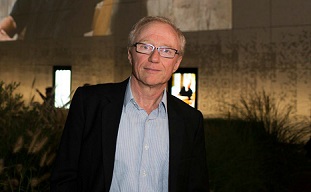
David Grossman (Jeruzalem, 25 januari 1954)
De Engelse schrijver William Somerset Maugham werd geboren in Parijs op 25 januari 1874. Zie ook alle tags voor William Somerset Maugham op dit blog.
Uit: Honolulu
“Nothing had prepared me for Honolulu. It is so far away from Europe, it is reached after so long a journey from San Francisco, so strange and so charming associations are attached to the name, that at first I could hardly believe my eyes. I do not know that I had formed in my mind any very exact picture of what I expected, but what I found caused me a great surprise. It is a typical western city. Shacks are cheek by jowl with stone mansions; dilapidated frame houses stand next door to smart stores with plate glass windows; electric cars rumble noisily along the streets; and motors, Fords, Buicks, Packards, line the pavement. The shops are filled with all the necessities of American civilisation. Every third house is a bank and every fifth the agency of a steamship company.
Along the streets crowd an unimaginable assortment of people. The Americans, ignoring the climate, wear black coats and high, starched collars, straw hats, soft hats, and bowlers. The Kanakas, pale brown, with crisp hair, have nothing on but a shirt and a pair of trousers; but the half-breeds are very smart with flaring ties and patent-leather boots. The Japanese, with their obsequious smile, are neat and trim in white duck, while their women walk a step or two behind them, in native dress, with a baby on their backs. The Japanese children, in bright coloured frocks, their little heads shaven, look like quaint dolls. Then there are the Chinese. The men, fat and prosperous, wear their American clothes oddly, but the women are enchanting with their tightly-dressed black hair, so neat that you feel it can never be disarranged, and they are very clean in their tunics and trousers, white, or powder blue, or black. Lastly there are the Filipinos, the men in huge straw hats, the women in bright yellow muslin with great puffed sleeves.
It is the meeting-place of East and West. The very new rubs shoulders with the immeasurably old. And if you have not found the romance you expected you have come upon something singularly intriguing. All these strange people live close to each other, with different languages and different thoughts; they believe in different gods and they have different values; two passions alone they share, love and hunger. And somehow as you watch them you have an impression of extraordinary vitality."
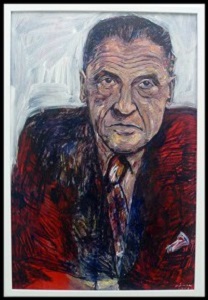
William Somerset Maugham (25 januari 1874 – 16 december 1965)
Portret door Rinne Abrugena, 2014
De Engelse schrijfster Virginia Woolf werd geboren op 25 januari 1882 te Londen. Zie ook alle tags voor Virginia Woolf op dit blog
Uit:The Waves
'Now they have all gone,' said Louis. 'I am alone. They have gone into the house for breakfast, and I am left standing by the wall among the flowers. It is very early, before lessons. Flower after flower is specked on the depths of green. The petals are harlequins. Stalks rise from the black hollows beneath. The flowers swim like fish made of light upon the dark, green waters. I hold a stalk in my hand. I am the stalk. My roots go down to the depths of the world, through earth dry with brick, and damp earth, through veins of lead and silver. I am all fibre. All tremors shake me, and the weight of the earth is pressed to my ribs. Up here my eyes are green leaves, unseeing. I am a boy in grey flannels with a belt fastened by a brass snake up here. Down there my eyes are the lidless eyes of a stone figure in a desert by the Nile. I see women passing with red pitchers to the river; I see camels swaying and men in turbans. I hear tramplings, tremblings, stirrings round me.
'Up here Bernard, Neville, Jinny and Susan (but not Rhoda) skim the flower-beds with their nets. They skim the butterflies from the nodding tops of the flowers. They brush the surface of the world. Their nets are full of fluttering wings. "Louis! Louis! Louis!" they shout. But they cannot see me. I am on the other side of the hedge. There are only little eye-holes among the leaves. Oh Lord, let them pass. Lord, let them lay their butterflies on a pocket-handkerchief on the gravel. Let them count out their tortoise-shells, their red admirals and cabbage whites. But let me be unseen. I am green as a yew tree in the shade of the hedge. My hair is made of leaves. I am rooted to the middle of the earth. My body is a stalk. I press the stalk. A drop oozes from the hole at the mouth and slowly, thickly, grows larger and larger. Now something pink passes the eyehole. Now an eye-beam is slid through the chink. Its beam strikes me. I am a boy in a grey flannel suit. She has found me. I am struck on the nape of the neck. She has kissed me. All is shattered.'
'I was running,' said Jinny, 'after breakfast. I saw leaves moving in a hole in the hedge. I thought "That is a bird on its nest." I parted them and looked; but there was no bird on a nest. The leaves went on moving. I was frightened. I ran past Susan, past Rhoda, and Neville and Bernard in the tool-house talking. I cried as I ran, faster and faster. What moved the leaves? What moves my heart, my legs? And I dashed in here, seeing you green as a bush, like a branch, very still, Louis, with your eyes fixed. "Is he dead?" I thought, and kissed you, with my heart jumping under my pink frock like the leaves, which go on moving, though there is nothing to move them. Now I smell geraniums; I smell earth mould. I dance. I ripple. I am thrown over you like a net of light. I lie quivering flung over you."
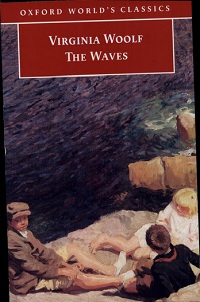
Virginia Woolf (25 januari 1882 – 28 maart 1941)
Cover
De Amerikaanse schrijver en regisseur Stephen Chbosky werd geboren op 25 januari 1970 in Pittsburgh, Pennsylvania. Zie ook alle tags voor Stephen Chbosky op dit blog.
Uit: The Perks of Being a Wallflower
“December 23, 1991
Dear friend, Sam and Patrick left with their family for the Grand Canyon yesterday. I don't feel too bad about it because I can still remember Sam's kiss. It feels peaceful and right. I even considered not washing my lips like they do on TV, but then I thought it would get too gross. So, instead I spent today walking around the neighborhood. I even got out my old sled and my old scarf. There is something cozy about that for me. I walked over to the hill where we used to go and sled. There were a lot of little kids there. I watched them flying. Doing jumps and having races. And I thought that all those little kids are going to grow up someday. And all of those little kids are going to do the things that we do. And they will all kiss someone someday. But for now, sledding is enough. I think it would be great if sledding were always enough, but it isn't. I'm really glad that Christmas and my birthday are soon because that means they will be over soon because I can already feel myself going to a bad place I used to go. After my Aunt Helen was gone, I went to that place. It got so bad that my mom had to take me to a doctor, and I was held back a grade. But now I'm trying not to think about it too much because that makes it worse. It's kind of like when you look at yourself in the mirror and you say your name. And it gets to a point where none of it seems real. Well, sometimes, I can do that, but I don't need an hour in front of a mirror. It happens very fast, and things start to slip away. And I just open my eyes, and I see nothing. And then I start to breathe really hard trying to see something, but I can't. It doesn't happen all the time, but when it does, it scares me. It almost happened this morning, but I thought of Sam's kiss, and it went away.”
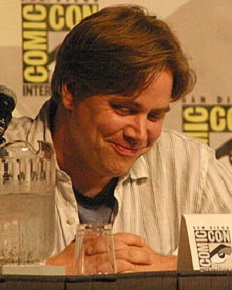
Stephen Chbosky (Pittsburgh, 25 januari 1970)
De Italiaanse schrijver Alessandro Baricco werd geboren op 25 januari 1958 in Turijn. Zie ook alle tags voor Alessandro Baricco op dit blog.
Uit: Oceaan van een zee (Vertaaldd door Manon Smits)
“Zand zover het oog reikt, tussen de laatste heuvels en de zee ‒ de zee ‒ in de koude lucht van een middag die bijna om is, en gezegend door de wind die altijd vanuit het noorden waait.
Het strand. En de zee.
Het zou perfectie kunnen zijn ‒ beelden bedoeld voor goddelijke ogen ‒ een wereld die plaatsvindt en meer niet, het zwijgende bestaan van water en land, een afgerond en volmaakt kunstwerk, waarheid ‒
Waarheid ‒ maar het is weer eens het verlossende deeltje dat mens heet dat het mechanisme van dit paradijs blokkeert, een kleinigheid die op zichzelf al volstaat om heel het enorme apparaat van onverbiddelijke waarheid op te heffen, het is iets van niks, maar het staat in het zand geplant, een onzichtbaar scheurtje in het oppervlak van die heilige icoon, een minuscule uitzondering op de perfectie van het oneindige strand. Vanuit de verte lijkt het niet meer dan een zwarte stip: in het niets, het niks van een man en een schildersezel.
De schildersezel is door middel van dunne touwtjes met vier stenen in het zand verankerd. Hij zwaait onmerkbaar in de wind die altijd vanuit het noorden waait. De man draagt lieslaarzen en een lange vissersjas. Hij staat rechtop, met de zee voor zich, en draait een dun penseel tussen zijn vingers. Op de schildersezel, een doek.
Hij is net een schildwacht ‒ dat moet duidelijk zijn ‒ die dat deel van de wereld staat te verdedigen tegen de zwijgende invasie van de perfectie, een kleine barst die dat spectaculaire decor van het bestaan versplintert.”
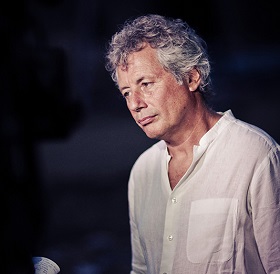
Alessandro Baricco (Turijn, 25 januari 1958)
De Finse dichter, toneelschrijver en uitgever Paavo Juhani Haavikko werd geboren in Helsinki op 25 januari 1931. Zie ook alle tags voor Paavo Haavikko op dit blog.
Uit: No. That’s to say, yes
Whoever threatens the republic of Finland's lack of alliances is this
nation's enemy, from the outside or from within.
Alliedness is no stranger than the arrival of spring here in the North.
The granite just begins to melt and crumble under our feet.
*
I am writing on the verso pages of a stock register. I find it hard to steal
paper, even from myself.
I do not know if it is possible to write about a war before it begins.
Later, at least, it has already been buried, and the green grass grows over it.
NATO has grown into a solidarity club sponsored by America. With its
changing ranks, its aim is world domination.
Join now, pay tomorrow.
*
What am I saying? I say what I mean. As if we could not remain at peace
without a war, or at least a threat of war.
Blood is in our blood. We are safe only when threatened, as in a bomb
shelter.
Low self-esteem, a poor sense of self, in secret. A good play, bad
dialogue.
Wavering mind, a small people afraid of silence. In silence, the sound
of trembling can be heard, then the rattling of arms covers it up, and one
feels better right away.
That is why NATO is important to Finland, a test of manhood, a
confirmation.
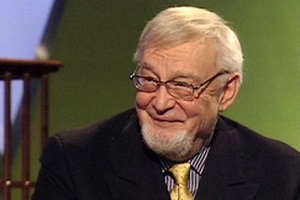
Paavo Haavikko (25 januari 1931 – 6 oktober 2008)
De Franse schrijver en journalist Robert Margerit werd geboren op 25 januari 1910 in Brive-la-Gaillarde. Zie ook alle tags voor Robert Margerit op dit blog.
Uit: La Révolution
« Ils exigeaient un mariage par le ministère d'un prêtre de la religion traditionnelle, parce qu'ils demeuraient fidèles à leur tradition bourgeoise, peut-être aussi avec l'idée que le tribun reculerait là-devant. C'était mal le connaître. « Il me faut des femmes », disait-il, et il en avait eu pas mal, juste avant et depuis la mort de Gabrielle. Ce n'était pas celles-là qui lui convenaient. Il lui en fallait une à lui, dans son foyer. Ayant jeté son dévolu sur Louise, hier encore la petite Louise, à présent si délicieusement éclose, il n'avait pas hésité à se mettre entre les mains de cet abbé Kéravenant, ami des Gély. Le lendemain, dans la même mansarde, devant une table en guise d'autel, fut célébré le mariage clandestin, suivi peu après de la brève formalité au bureau de la section. C'est le catholique Lanjuinais, gallican, qui avait fait transformer les registres paroissiaux, tenus par les ecclésiastiques, en registres d'état civil, confiés aux officiers municipaux. Dans la relevée, les nouveaux époux reçurent quelques amis, cour du Commerce où le portrait de Gabrielle demeurait fleuri sur la cheminée du salon. Lise alla embrasser la mariée, féliciter Danton. Claude, venu un instant, repartit bien vite, appelé par le travail. La besogne, au pavillon de l'Égalité, augmentait sans cesse avec la complexité et les périls d'une situation terriblement confuse. Le 3 juin, quand les gendarmes expédiés par le Comité révolutionnaire s'étaient présentés au domicile des trente et un députés ou ministres en état d'arrestation provisoire, la plupart d'entre eux avaient disparu. Ils se cachaient encore dans Paris, assurément. On en aurait ressaisi un bon nombre si on l'avait voulu. »
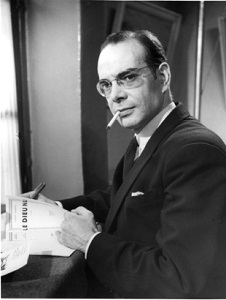
Robert Margerit (25 januari 1910 - 27 juni 1988)
Zie voor nog meer schrijvers van de 25e januari ook mijn blog van 25 januari 2017 en ook mijn blog van 25 januari 2015 deel 2 en eveneens deel 3.
Zie voor bovenstaande schrijvers ook mijn blog van 25 januari 2007 en ook mijn blog van 25 januari 2008 en eveneens mijn blog van 25 januari 2009.
25-01-2018 om 18:09
geschreven door Romenu 
Tags:Renate Dorrestein, Lisa Weeda, David Grossman, William S. Maugham, Virginia Woolf, Stephen Chbosky, Alessandro Baricco, Paavo Haavikkom, Robert Margerit, Romenu
|

